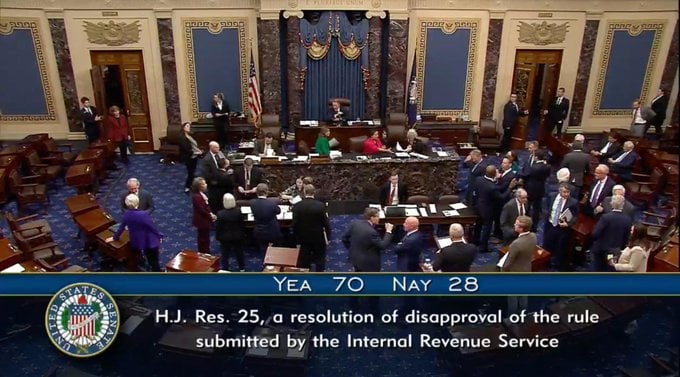
Photo: Jim Watson
Trump signs resolution overturning IRS DeFi broker rule
Given the resolution’s strong bipartisan backing and Trump’s pro-crypto rhetoric, a veto was unlikely.
President Donald Trump today signed legislation nullifying an IRS rule that would have required decentralized finance (DeFi) platforms to report crypto transaction data and collect customer information, according to a press release issued by Rep. Mike Carey, who introduced the bill alongside Sen. Ted Cruz last December.
“This rule would have undermined American leadership on cryptocurrency and I am grateful to President Trump for signing my resolution into law,” said Sen. Cruz in a statement upon the Congressional Review Act (CRA) being signed into law.
“The resolution is a victory for innovation, privacy, and economic freedom. We are protecting the developers who are building the future of cryptocurrency, making clear that the United States will not cede digital leadership to China, and preserving the ability of Americans to conduct transactions without government interference,” he added.
According to Rep. Carey, this marks the first-ever crypto bill signed into law.
“The DeFi Broker Rule needlessly hindered American innovation, infringed on the privacy of everyday Americans, and was set to overwhelm the IRS with an overflow of new filings that it doesn’t have the infrastructure to handle during tax season. By repealing this misguided rule, President Trump and Congress have given the IRS an opportunity to return its focus to the duties and obligations it already owes to American taxpayers instead of creating a new series of bureaucratic hurdles,” Rep. Carey stated. “I thank President Trump for signing this important bill into law and Crypto Czar Sacks for his leadership in supporting America’s continued place as the global leader in the emerging crypto industry.”
The measure, also known as H.J.Res.25, aims to render the IRS’ “Gross Proceeds Reporting by Brokers That Regularly Provide Services Effectuating Digital Asset Sales” void.
This rule, introduced in the last days of Biden’s term, expanded the definition of “broker” to include non-custodial entities like DeFi platforms and trading front-end service providers.
As part of the expanded scope, DeFi projects would need to report gross proceeds from crypto sales and collect taxpayer data, including identities and transaction histories.
The resolution’s enactment means the rule will “have no force or effect,” immediately repealing requirements for DeFi platforms and other digital asset brokers to report gross proceeds of sales on Form-1099.
Its repeal reduces compliance burdens criticized as impractical and innovation-stifling by many members of the crypto sector, like the Blockchain Association.
The measure cleared the Senate on March 4 before passing the House the following week. However, given the measure’s linkage to a budgetary matter, a concluding vote in the Senate was requisite before its transmittal to the President.
On March 26, the Senate voted to repeal the controversial crypto tax rule.

Under the Congressional Review Act, the IRS cannot issue a substantially similar rule without new congressional authorization. This prevents the agency from reimposing comparable reporting requirements on digital asset brokers without explicit approval from Congress.
Trump’s signature aligns with his administration’s deregulatory stance, particularly toward emerging technologies like crypto, which he has increasingly embraced during his 2024 campaign and second term.
The White House has endorsed the resolution, asserting in a March 4 statement that the Biden-era rule negatively impacts American innovation, raises serious privacy issues related to taxpayer information, and places an unreasonable compliance burden on DeFi companies.
